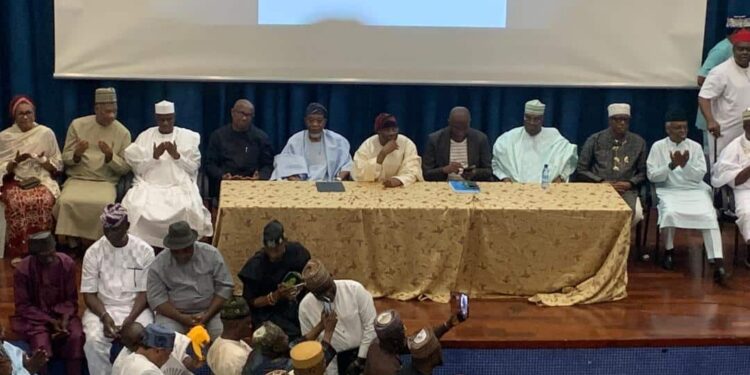Nigeria’s opposition parties are witnessing intensifying political maneuvering as the 2027 presidential election approaches, with four prominent figures emerging as key contenders in what promises to be a complex battle for party tickets and coalition leadership.
Former Vice President Atiku Abubakar, ex-Labour Party candidate Peter Obi, former Transportation Minister Rotimi Amaechi, and ex-President Goodluck Jonathan are positioning themselves as central players in the contest for the African Democratic Congress and Peoples Democratic Party nominations.
The political calculations extend beyond individual ambitions, encompassing broader questions about party control, coalition dynamics, and strategic positioning among established politicians and emerging challengers seeking to unseat President Bola Tinubu in 2027.
Within the ADC, Atiku appears to be consolidating influence despite maintaining public silence about his presidential intentions. Political observers note that his loyalists have secured strategic positions across the party’s National Working Committee, Board of Trustees, and state chapters, creating what analysts describe as a systematic effort to position himself favorably for the party’s presidential ticket.
This behind-the-scenes maneuvering has generated speculation about another presidential campaign from the former vice president, who has contested the presidency multiple times, including unsuccessful bids in 2019 and 2023.
Meanwhile, Peter Obi’s transition from the Labour Party to the ADC coalition has encountered significant obstacles. Despite entering with considerable momentum and positioning himself as capable of transforming Nigeria within a four-year presidency, his integration has faced internal resistance.
In August, a leaked memo from the Obidient Movement highlighted growing tensions within the coalition, alleging systematic exclusion of Obi’s supporters from critical decision-making processes.
“Several of our designated representatives and members are reportedly being excluded from crucial meetings where major decisions affecting the coalition are made. This creates an impression of marginalisation and undermines trust,” the internal document revealed.
While Obi maintains substantial online support and grassroots enthusiasm, his prospects for securing the ADC ticket appear complicated by Atiku’s apparent organizational control within the party structure.
In contrast to his competitors’ cautious approaches, Rotimi Amaechi has openly declared his presidential ambitions and actively campaigned for the ADC nomination. The former Rivers State Governor has positioned his insider knowledge of the ruling APC as a strategic advantage against President Tinubu.
“I know Tinubu very well. I know his strengths. I know his weaknesses. And I know that if allowed to fly the flag of ADC, I will defeat Tinubu for sure,” Amaechi stated during a recent social media engagement.
However, Amaechi’s path to the nomination faces challenges in a party where Atiku’s influence appears substantial and Obi’s supporters maintain significant presence.
The PDP, meanwhile, has initiated efforts to court Obi’s return to the party fold. Leading figures, including PDP Governors Forum chairman Bala Mohammed, believe Obi’s comeback could strengthen the party’s electoral prospects and help unify Nigeria’s fragmented opposition landscape.
However, internal PDP dynamics reveal divisions about this strategy. Party chieftain Umar Sani has dismissed Obi’s single-term presidency pledge as “political talk,” suggesting northern PDP members would prefer Jonathan over the former Anambra Governor.
Jonathan’s potential candidacy continues generating discussion across political circles, with supporters like former Jigawa Governor Sule Lamido arguing the ex-president has “unfinished business” requiring completion. Constitutionally, Jonathan remains eligible for one additional four-year presidential term.
The competition between ADC and PDP represents a deeper struggle for opposition leadership in Nigeria’s political landscape. Both parties recognize they are competing for similar voter demographics and opposition support bases.
If the PDP successfully recruits Obi, it could significantly weaken the ADC coalition’s electoral strength and unified opposition narrative. Conversely, should the ADC retain Obi or successfully nominate Atiku, it could challenge the PDP’s traditional role as Nigeria’s primary opposition party.
Political analysts suggest the coming months will prove crucial in determining alliance formations, potential party defections, and the overall strategic direction of Nigeria’s opposition politics as parties prepare for what promises to be a highly competitive presidential election.
The stakes extend beyond individual political careers, potentially reshaping Nigeria’s political landscape and determining whether the opposition can present a unified challenge to the ruling APC’s continued governance under President Tinubu.

















